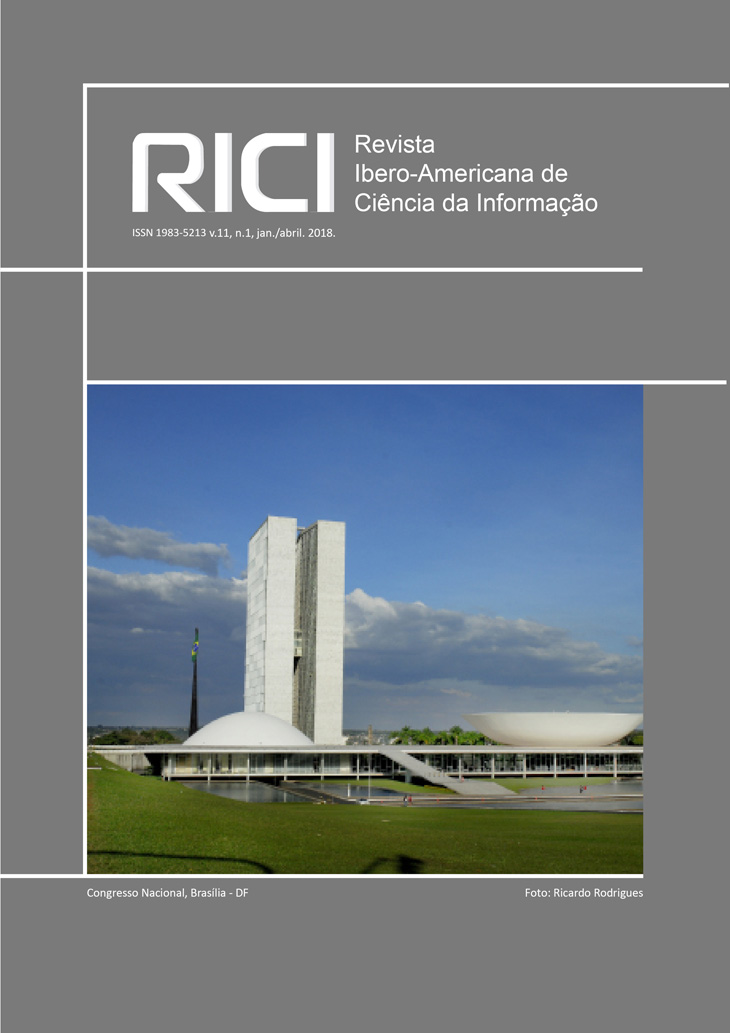Audit of preservabledigital repositories
DOI:
https://doi.org/10.26512/rici.v11.n1.2018.8572Keywords:
digital audit, digital preservation, digital repository, technological obsolescenceAbstract
This paper aims to demonstrate the attributes and responsibilities of a reliable archival digital repository. The reliability of archival digital repositories is achieved through its certification, which must be based on ISO 16363/2012, based on the Open Archival Information System (OAIS) conceptual model, and on the application of tools such as TRAC (Trustworthy Repository Audit & Certification). It will be approached the use of auditing methodologies and the adoption of strategies that aim to avoid the technological absoluteness, allowing the access to the documents in the long term, maintaining its authenticity.Downloads
References
BORGMAN C. L. Research data: who will share what, with whom, when, and why? In: CHINA-NORTH AMERICAN LIBRARY CONFERENCE. Beijing: CALA, 2016. Disponível em: http://works.bepress.com/borgman/238/. Acesso: 15 set. 2017.
CARVALHO, J. Auditoria ISO 16363 a Repositórios Institucionais. IN: CONGRESSO NACIONAL BAD., 2015, Portugal. Anais eletrônico. Évora: CNBAD, 2015. Disponível em: https://www.bad.pt/publicacoes/index.php/congressosbad/article/viewFile/1459/pdf_91. Acesso: 25 out. 2017.
CONSELHO NACIONAL DE ARQUIVOS (CONARQ). Requisitos Para a Implementação de Repositórios Arquivísticos Digitais Confiáveis - RDC-Arq. 2015. Disponível em: http://www.conarq.gov.br/images/publicacoes_textos/diretrizes_rdc_arq.pdf. Acesso: 28 set. 2017.
DATA SEAL OF APPROVAL. Selo de aprovação de dados e diretrizes. Versão 2017-2019. Disponível em: https://assessment.datasealofapproval.org/guidelines_54/html. Acesso: 10 nov. 2016.
FONTANA, F.F. ARCHIVEMATICA como ferramenta para acesso e preservação digital à longo prazo. Ágora, Florianópolis, v.24, p. 62-82, 21 abril 2014. ISSN 0103-3557. Disponível em: https://agora.emnuvens.com.br/ra/article/view/457. Acesso: 13 out. 2017.
LEITE, F.et al. Boas práticas para a construção de repositórios institucionais da produção científica. Brasília: IBICT, 2012. 34 p.
MÁRDERO ARELLANO, M. A. Preservação de documentos digitais. Ciência da Informação, Brasília, v. 33, n.2, p. 15-27, maio/ago. 2004. Disponível em: http://revista.ibict.br/ciinf/article/view/1043. Acesso: 15 out. 2017.
SANTOS, H. M.; FLORES, D. Repositórios digitais confiáveis para documentos arquivísticos: ponderações sobre a preservação em longo prazo. Perspectivas em Ciência da Informação, Belo Horizonte, v. 20, n.2, p. 198-218, abr./jun. 2015. Disponível em: http://portaldeperiodicos.eci.ufmg.br/index.php/pci/article/view/2341. Acesso: 11 out. 2017.
SANTOS, Ângela Sofia de Sousa. Repositório Digital Seguro: um modelo de requisitos para um provedor de serviços de certificação. MESTRADO EM CIÊNCIA DA INFORMAÇÃO. Faculdade de Engenharia Universidade do Porto), p. 32, 2015. Disponível em: https://repositorio-aberto.up.pt/handle/10216/79978. Acesso: 09 out. 2017
SANTOS H. M. Flores D. Os fundamentos da diplomática contemporânea na preservação de documentos arquivísticos digitais. Biblos, Revista do Instituto de Ciências Humanas e da Informação, Rio Grande, v. 30, n. 2, 2016. Disponível em: https://www.seer.furg.br/biblos/article/view/4825/4440. Acesso: 11 out. 2017
SAYÃO L. F.; SALES L. F. Algumas considerações sobre os repositórios digitais de dados de pesquisa. Informação & Informação, Londrina, v. 21, n. 2, p. 90-115. Disponível em: http://www.uel.br/revistas/uel/index.php/informacao/article/view/27939. Acesso: 2 out. 2017.
SCHÄFER, M. B.; CONSTANTE, S. N. E. Políticas e estratégias para a preservação da informação digital. Ponto de Acesso, Salvador, v. 6, n. 3, 2012. Disponível em: https://portalseer.ufba.br/index.php/revistaici/article/view/6449 Acesso: 19 out. 2017.
TÉRMENS, M. LEIJA, D. Auditoría de preservación digital con NDSA Levels. El profesional de la información, Barcelona, v. 26, n. 3, p. 447-456, 2017. Disponível em: https://recyt.fecyt.es/index.php/EPI/article/view/epi.2017.may.11 Acesso: 8 nov. 2017.
THOMAZ, K. P. Repositórios Digitais confiáveis e certificação. Arquivística.net, Rio de Janeiro, v. 3, n.1, p. 80-89, jan. - jun. 2007. Disponível em: www.brapci.inf.br/index.php/article/download/10726 Acesso em: 10 out. 2017.
UZWYSHYN, R. Research data repositories: the what, when, why, and how. Computers in Libraries, Westport, v. 36, n. 3, Apr. 2016. Disponível em: http://www.infotoday.com/cilmag/apr16/Uzwyshyn--Research-Data-Repositories.shtml Acesso: 16 set. 2017.
VIDAL, A. A conservação e a preservação de documentos digitais: um desafio na era da sociedade de informação. Revista da Faculdade de Ciências Humanas e Sociais, Porto, v. 7, p. 144-154, 2010. Disponível em: http://hdl.handle.net/10284/2809 Acesso: 17 out. 2017.
WEITZEL, S. R. O papel dos repositórios institucionais e temáticos na estrutura da produção científica. Em questão, Porto Alegre, v. 12, n.1, p. 51-71, jan./jun. 2006. Disponível em: http://www.redalyc.org/html/4656/465645954004/ Acesso: 28 out. 2017.
Downloads
Published
How to Cite
Issue
Section
License
Copyright (c) 2021 Diego Bil Silva Barros, Igor Dias Ferrer, Cleusa Maria de Souza Maia

This work is licensed under a Creative Commons Attribution 4.0 International License.
Copyright Notice
Authors who publish in this journal agree to the following terms:
- Authors retain copyright and grant the journal right of first publication with the work simultaneously licensed under the Creative Commons Attribution License 4.0, allowing the sharing of work and recognition of the work of authorship and initial publication in this journal.
- Authors are able to take on additional contracts separately, non-exclusive distribution of the version of the paper published in this journal (ex.: distribute to an institutional repository or publish as a book), with an acknowledgment of its initial publication in this journal.
- Authors are permitted and encouraged to distribute their work online (eg.: in institutional repositories or on their website) at any point before or during the editorial process, as it can lead to productive exchanges, as well as increase the impact and citation the published work.
















